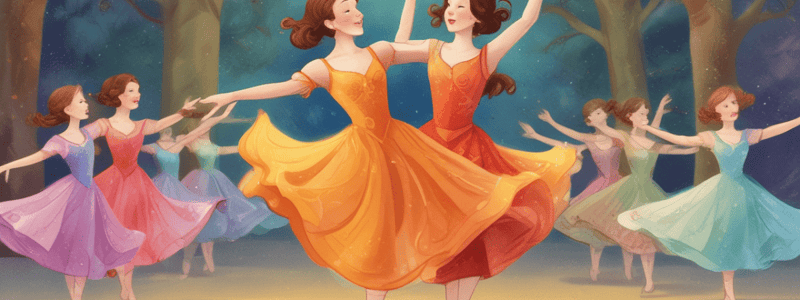Podcast
Questions and Answers
What is the benefit of exposing children to diverse music at a young age?
What is the benefit of exposing children to diverse music at a young age?
- To help them develop a capacity to understand various musical tonalities (correct)
- To restrict their musical understanding to their own culture
- To make them professional musicians
- To make them experts in music theory
Why is it unnecessary to understand music theory to teach music to children?
Why is it unnecessary to understand music theory to teach music to children?
- Because music theory is too complex for children
- Because music theory is a requirement for professional musicians only
- Because enthusiasm for music is contagious (correct)
- Because children are incapable of learning music theory
What is the result of not engaging with diverse musical styles?
What is the result of not engaging with diverse musical styles?
- Children will retain their capacity to understand diverse musical styles
- Children will develop a broader understanding of music
- Children will become professional musicians faster
- Children will lose their capacity to understand diverse musical styles (correct)
What is the significance of incorporating different genres and cultures of music in education?
What is the significance of incorporating different genres and cultures of music in education?
What is the idea behind incorporating jazz music in education?
What is the idea behind incorporating jazz music in education?
Why is it important to expose children to music from Asia, Latin America, and Africa?
Why is it important to expose children to music from Asia, Latin America, and Africa?
What is the significance of starting musical education at a young age?
What is the significance of starting musical education at a young age?
What is the result of restricting children's musical knowledge to their own culture?
What is the result of restricting children's musical knowledge to their own culture?
What is the role of the instructor in teaching music to children?
What is the role of the instructor in teaching music to children?
What is the significance of music education in children's cognitive development?
What is the significance of music education in children's cognitive development?
Flashcards are hidden until you start studying
Study Notes
Dance in a Preschool Environment
- Dance is an essential activity in preschool that contributes to the holistic development of young children.
- Dance enhances motor skills, coordination, and control through movements like jumping, twirling, and balancing.
- Dance boosts cognitive abilities by requiring children to remember steps and sequences, enhancing memory, concentration, and spatial awareness.
- Dance is a powerful tool for self-expression, allowing children to communicate their feelings and emotions non-verbally.
- Participating in dance routines can build confidence and self-esteem, especially when children perform in front of peers and receive positive reinforcement.
- Collaborative dance activities promote teamwork, teach children to share space respectfully, and help in forming positive relationships.
- Dance encourages imagination and innovation, stimulating creative thinking through storytelling and movement.
Creative Dance
- Creative dance is the exploration of the Elements of Dance through structured improvisation.
- Creative dance is accessible to everyone, with no right or wrong way to do it.
- Creative dance supports physical development, including muscle development, balance, control, coordination, and proprioception (the ability to sense one's own movement and location in space).
- Creative dance helps develop self-control and regulation of the body, including impulse control and body awareness.
Music in a Preschool Setting
- Music in preschool encompasses a variety of activities designed to engage young children with sound in a playful and educational manner.
- Music activities in preschool include singing, dancing, playing instruments, and exploring sounds.
- Music helps in nurturing a child's development across several domains, including cognitive, social, emotional, physical, and language skills.
- Music activities include singing simple songs, moving and dancing to music, playing instruments, listening to music, creating music, and playing musical games.
- Music can be used to teach various concepts, such as counting, the alphabet, and social skills like teamwork and sharing.
- Music can be a powerful tool for fostering cultural awareness as children explore songs and instruments from different parts of the world.
Supporting Children's Musical Development
- Young children are primed to actively engage in music from birth, and early childhood educators can harness this innate joy of music-making.
- To support children's musical development, educators should provide access to music, model singing, and encourage children to play with sound and explore their own voices.
- Educators should also respond to children's spontaneous music-making, provide rich environments for music exploration, and expose children to a rich diversity of music from different cultures and genres.
- Children should be encouraged to play with song and music, and educators should not limit themselves to one style of music or one genre.
Studying That Suits You
Use AI to generate personalized quizzes and flashcards to suit your learning preferences.




